北京市人大附中2020届初三第二学期月考英语试题及答案(word)
人大附中2020届初三第二学期月考英语试题及答案
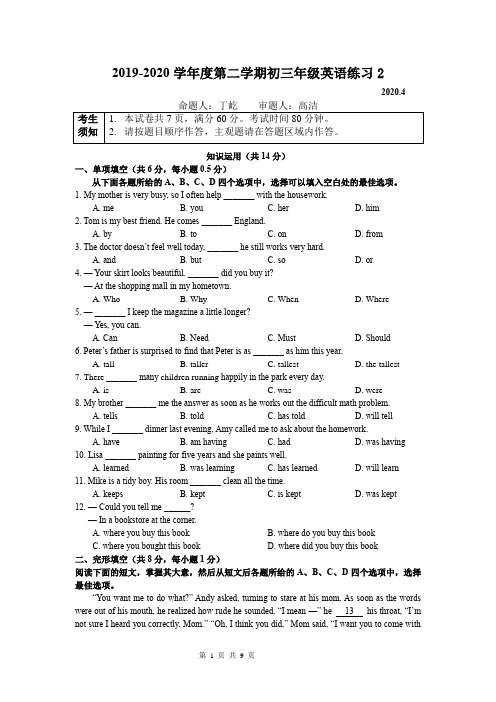
2019-2020学年度第二学期初三年级英语练习22020.4知识运用(共14分)一、单项填空(共6分,每小题0.5分)从下面各题所给的A、B、C、D四个选项中,选择可以填入空白处的最佳选项。
1. My mother is very busy, so I often help _______ with the housework.A. meB. youC. herD. him2. Tom is my best friend. He comes _______ England.A. byB. toC. onD. from3. The doctor doesn’t feel well today, _______ he still works very hard.A. andB. butC. soD. or4. — Your skirt looks beautiful. _______ did you buy it?— At the shopping mall in my hometown.A. WhoB. WhyC. WhenD. Where5. — _______ I keep the magazine a little longer?— Yes, you can.A. CanB. NeedC. MustD. Should6. Peter’s father is surprised to find that Peter is as _______ as him this year.A. tallB. tallerC. tallestD. the tallest7. There _______ many children running happily in the park every day.A. isB. areC. wasD. were8. My brother _______ me the answer as soon as he works out the difficult math problem.A. tellsB. toldC. has toldD. will tell9. While I _______ dinner last evening, Amy called me to ask about the homework.A. haveB. am havingC. hadD. was having10. Lisa _______ painting for five years and she paints well.A. learnedB. was learningC. has learnedD. will learn11. Mike is a tidy boy. His room _______ clean all the time.A. keepsB. keptC. is keptD. was kept12. — Could you tell me ______?— In a bookstore at the corner.A. where you buy this bookB. where do you buy this bookC. where you bought this bookD. where did you buy this book二、完形填空(共8分,每小题1分)阅读下面的短文,掌握其大意,然后从短文后各题所给的A、B、C、D四个选项中,选择最佳选项。
北京初三初中英语月考试卷带答案解析
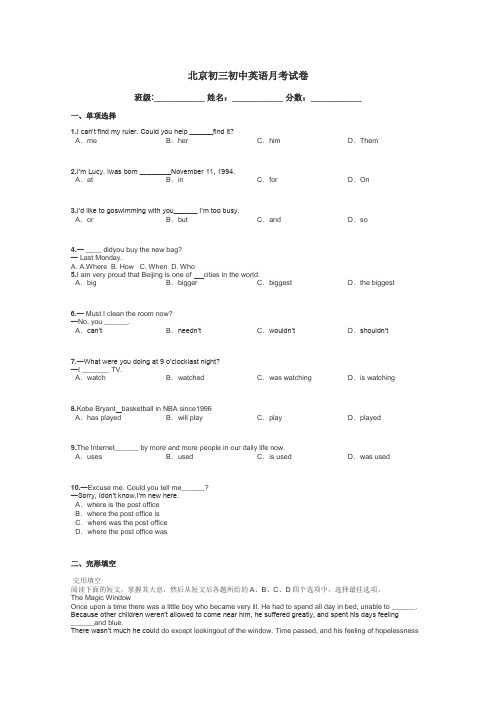
北京初三初中英语月考试卷班级:___________ 姓名:___________ 分数:___________一、单项选择1.I can’t find my ruler. Could you help ______find it?A.me B.her C.him D.Them2.I’m Lucy. Iwas born ________November 11, 1994.A.at B.in C.for D.On3.I’d like to goswimming with you______ I’m too busy.A.or B.but C.and D.so4.— ____ didyou buy the new bag?— Last Monday.A. A.WhereB. HowC. WhenD. Who5.I am very proud that Beijing is one of cities in the world.A.big B.bigger C.biggest D.the biggest 6.— Must I clean the room now?—No, you ______.A.can’t B.needn’t C.wouldn’t D.shouldn’t 7.—What were you doing at 9 o’clocklast night?—I _______ TV.A.watch B.watched C.was watching D.is watching8.Kobe Bryant basketball in NBA since1996A.has played B.will play C.play D.played9.The Internet______ by more and more people in our daily life now.A.uses B.used C.is used D.was used 10.—Excuse me. Could you tell me______?—Sorry, Idon’t know.I’m new here.A.where is the post officeB.where the post office isC.where was the post officeD.where the post office was二、完形填空完形填空阅读下面的短文,掌握其大意,然后从短文后各题所给的A、B、C、D四个选项中,选择最佳选项。
2019-2020学年北京市海淀区人大附中九年级(下)月考英语试卷(4月份)

(2)In ancient China,kites were used to________.
A. make firecrackersB. buy and sell things
C. help sailors find their wayD. send messages during battles.
Then the theater darkened.The curtain went up.
The whole performance felt as if it were taking place on some far﹣off planet.Andy loved the story and the music was so amazing that it was like nothing he had ever heard.
Compass
about 1000 years ago
to help sailors find their way
(1)Paper was invented about________.
A. 5300 years agoB. 2500 years ago
C. 2200 years agoD. 1300 years ago.
北京市人大附中2019-2020学年九年级下学期2月月考英语试题及参考答案
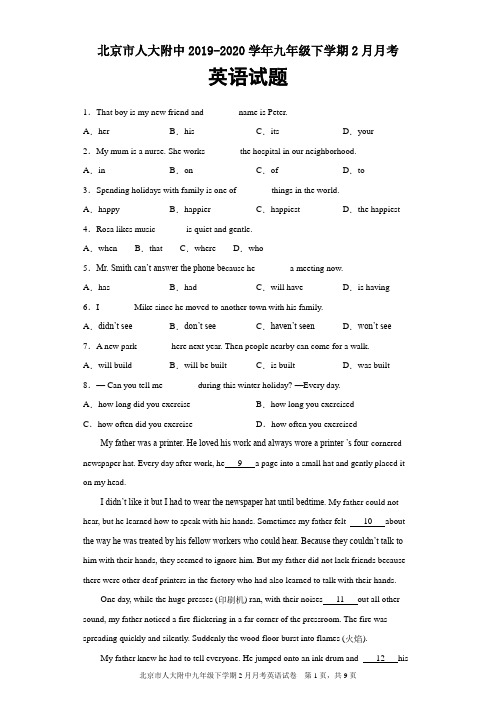
A.how long did you exerciseB.how long you exercised
C.how often did you exerciseD.how often you exercised
My father knew he had to tell everyone. He jumped onto an ink drum and12hisarms excitedly. Luckily he caught the attention of a fellow printer who also couldn’t hear. My father ’s hands shouted through the terrible noise of the printing presses,FIRE! FIRE!TELL EVERYONE TO GET OUT! TELL THE HEARING ONES!
北京市人大附中2019-2020学年九年级下学期2月月考
英语试题
1.That boy is my new friend and________name is Peter.
A.herB.hisC.itsD.your
2.My mum is a nurse. She works________the hospital in our neighborhood.
His friend ran to fellow workers who could hear, then he13to the fire, which had now spread to the wall next to the only exit. Everybody saw the fire and went out quickly.
人教版2020学年度第二学期第二次月考九年级英语测试卷(含答案)
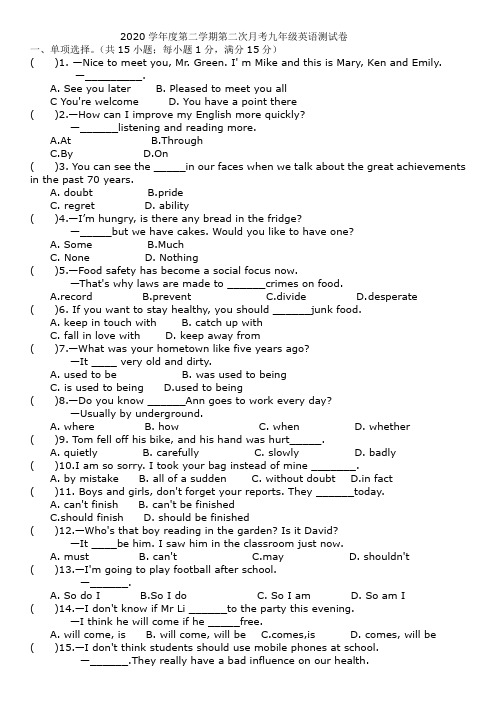
2020学年度第二学期第二次月考九年级英语测试卷一、单项选择。
(共15小题;每小题1分,满分15分)( )1. —Nice to meet you, Mr. Green. I' m Mike and this is Mary, Ken and Emily.—_________.A. See you laterB. Pleased to meet you allC You're welcome D. You have a point there( )2.—How can I improve my English more quickly?—______listening and reading more.A.AtB.ThroughC.ByD.On( )3. You can see the _____in our faces when we talk about the great achievements in the past 70 years.A. doubtB.prideC. regretD. ability( )4.—I’m hungry, is there any bread in the fridge?—_____but we have cakes. Would you like to have one?A. SomeB.MuchC. NoneD. Nothing( )5.—Food safety has become a social focus now.—That's why laws are made to ______crimes on food.A.recordB.preventC.divideD.desperate( )6. If you want to stay healthy, you should ______junk food.A. keep in touch withB. catch up withC. fall in love withD. keep away from( )7.—What was your hometown like five years ago?—It ____ very old and dirty.A. used to beB. was used to beingC. is used to beinged to being( )8.—Do you know ______Ann goes to work every day?—Usually by underground.A. whereB. howC. whenD. whether( )9. Tom fell off his bike, and his hand was hurt_____.A. quietlyB. carefullyC. slowlyD. badly( )10.I am so sorry. I took your bag instead of mine _______.A. by mistakeB. all of a suddenC. without doubtD.in fact( )11. Boys and girls, don't forget your reports. They ______today.A. can't finishB. can't be finishedC.should finishD. should be finished( )12.—Who's that boy reading in the garden? Is it David?—It ____be him. I saw him in the classroom just now.A. mustB. can'tC.mayD. shouldn't( )13.—I'm going to play football after school.—______.A. So do IB.So I doC. So I amD. So am I( )14.—I don't know if Mr Li ______to the party this evening.—I think he will come if he _____free.A. will come, isB. will come, will bees,isD. comes, will be ( )15.—I don't think students should use mobile phones at school.—______.They really have a bad influence on our health.A. I agree with you.B. Not at allC. No problem.D. It's my pleasure二、完形填空(共20小题;每小题1.5分,满分30分)AJim, a successful businessman, told the experience of his childhood.When he was 12, his parents __16__. He was alone and didn’t get on well with others. People always laughed __17___him. No one showed kindness(友善)to him. His only friend was a dog named Tige.One day as he walked down the street, a young lady was walking in front of him. Suddenly one of her bags dropped from her arms. As she stopped __18__, she dropped other bags. He came to help her. “Thank you, dear! You are a nice little boy!” She said kindly, smiling.A special feeling came to him. These were __19___ kind words he had ever heard. He watched her __20___she went far away, and he whistled(吹口哨)to his dog and went directly to the river nearby.“Thank you, dear! You are a nice little boy!” he repeated the woman's words. Then in a low __21___he said to his dog, “You are a nice little dog!” Tige raised__22___ears as if(似乎)it understood.“Uh! Even a dog likes it” he said. “Well, Tige, I won't say unkind words to you any more. ” Tige waved its tail happily.The boy thought and thought. Finally he looked at himself in the river. He saw__23__ but a dirty boy. He washed his face__24__. Again he looked. He saw a clean nice boy. He was amazed(震惊). From then on, he had a new life.After telling this, the businessman stopped for a while, and then he said, “Ladies and gentlemen, this is the very place where that kind woman planted in me the first seed (种子)of kindness. All of us should learn about k indness. __25__ a great power it has!” If you show kindness to others, you will be an able man.( )16. A.dead B.dying C.died D.die( )17. A.at B.to C./ D.of( )18. A.picking it up B.picking up it C.to pick up it D.to pick it up( )19. A.the first B.first C.the last D.the first time( )20. A.until B.before C.when D.while( )21. A.sound B.noise C.noisy D.voice( )22. A.it B.it's C.one's D. its( )23. A.something B.nothing C.anything D.somebody( )24. A.carefully B.careful C.careless D.carelessly( )25. A. What B.How C.It D. It seemedBMore than 10,000 children go missing in China every year. Most of these children are abducted(诱拐)by bad people. Then, some __26___ the children to people who live in the countryside; others__27___ them become beggars(乞丐).Have you ever walked down the street and seen a woman with a child sleeping in her arms begging for(乞求)__28__? At that moment many people may feel __29___ and drop a coin or more in her cup. However, in fact the child is not __30__. He or she may not even be sleeping.In 2009. the government started to fight __31__these people. So far, more than 800 children have been __32___to their parents. Yu Jianrong,a Beijinger started a blog (博客)__33__people are encouraged to post pictures of child beggars.Yu’s idea has influenced many people. Many people take photos __34__ they seechild beggars on the street,and then they put them onto the blog to help the children.The fight against child trafficking(贩卖)could be supported by __35__, including you!A simple photo may change the whole life of an abducted child.( )26. A.allow B.sell C.ask D.buy( )27. A.make B.encourage C.advise D.help( )28. A.time B.space C.rain D.money( )29. A. tired B.sad C.happy D.excited( )30. A.his B. its C.hers D.theirs( )31. A.about B.for C.with D.against( )32. A.moved B.returned C.gotten D.made( )33. A.whose B.where C.who D.which( )34. A.when B.since C.until D.before( )35. A.somebody B.nobody C. everyone D. no one三、补全对话(共5小题;每小题1分,满分5分)根据对话内容,从方框内的选项中选出能填入空白处的最佳选项,其中有两个为多余选项。
北京市2019-2020年初三第二学期第一次月考英语试卷
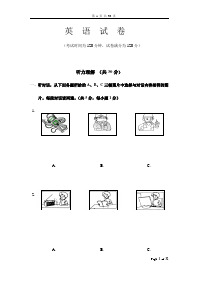
英 语 试 卷(考试时间为120分钟,试卷满分为120分)听力理解 (共30分)一、听对话,从下面各题所给的A 、B 、C 三幅图片中选择与对话内容相符的图片。
每段对话读两遍。
(共5分,每小题1分) 1.A .B .C .2.A .B .C .3.A .B .C .4.A .B .C .5.A .B. C .二、听对话或独白,根据对话或独白的内容,从下面各题所给的A、B、C三个选项中选择最佳选项。
每段对话或独白你将听两遍。
(共15分,每小题1.5分)请听一段对话,完成第6至第7小题。
6.What are they going to do on Saturday morning?A.Have a training lesson.B.Go to the cinema.C.Watch a football match.7.When are they going to have a training class?A.At 4 pm. B.At 7 pm. C.At 8 am.请听一段对话,完成第8至第9小题。
8.Who is the woman’s role model?A.Bill Gates. B.Wang Xuan. C.Liu Yang.9.What does the woman advise the man to do first?A.Try to improve computer skills.B.Try to finish the homework.C.Try to work hard.请听一段对话,完成第10至第11小题。
10.Where are the two speakers?A.At a bus stop. B.In a park. C.In an office. 11.What are they mainly talking about?A.The weather. B.The bus. C.The work.请听一段对话,完成第12至第13小题。
2020 2人大附中月考英语试题(3)
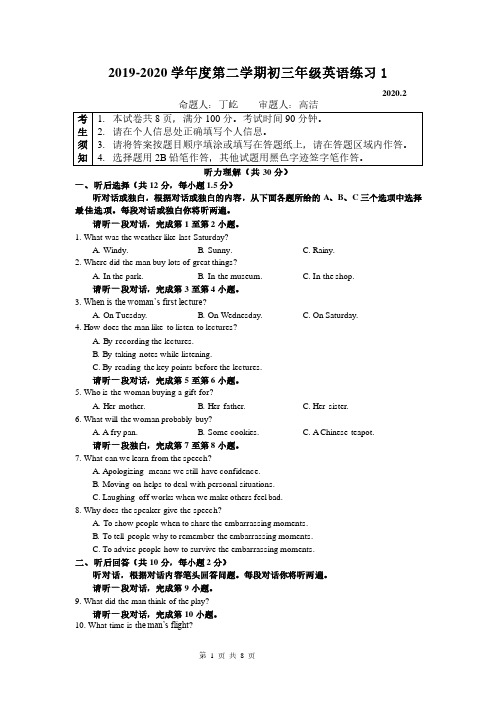
2019-2020学年度第二学期初三年级英语练习12020.2听力理解(共30分)一、听后选择(共12分,每小题1.5分)听对话或独白,根据对话或独白的内容,从下面各题所给的A、B、C三个选项中选择最佳选项。
每段对话或独白你将听两遍。
请听一段对话,完成第1至第2小题。
1. What was the weather like last Saturday?A. Windy.B. Sunny.C. Rainy.2. Where did the man buy lots of great things?A. In the park.B. In the museum.C. In the shop.请听一段对话,完成第3至第4小题。
3. When is the woman’s first lecture?A. On Tuesday.B. On Wednesday.C. On Saturday.4. How does the man like to listen to lectures?A. By recording the lectures.B. By taking notes while listening.C. By reading the key points before the lectures.请听一段对话,完成第5至第6小题。
5. Who is the woman buying a gift for?A. Her mother.B. Her father.C. Her sister.6. What will the woman probably buy?A. A fry pan.B. Some cookies.C. A Chinese teapot.请听一段独白,完成第7至第8小题。
7. What can we learn from the speech?A. Apologizing means we still have confidence.B. Moving on helps to deal with personal situations.C. Laughing off works when we make others feel bad.8. Why does the speaker give the speech?A.To show people when to share the embarrassing moments.B. To tell people why to remember the embarrassing moments.C. To advise people how to survive the embarrassing moments.二、听后回答(共10分,每小题2分)听对话,根据对话内容笔头回答问题。
2020年北京市中考英语试题word版含答案(已校对)
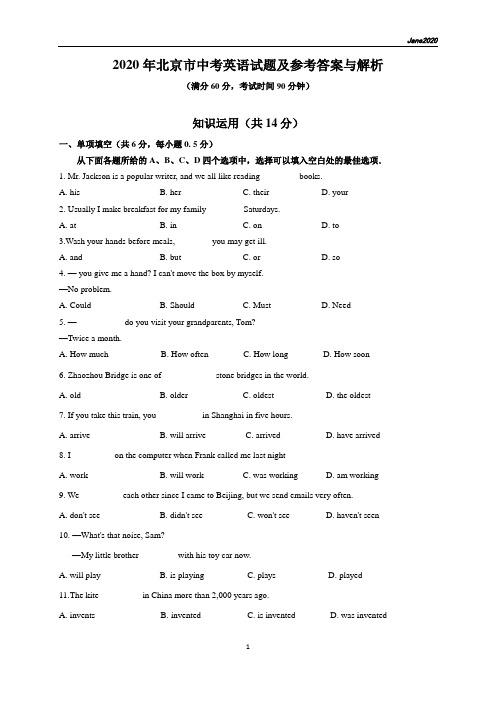
2020年北京市中考英语试题及参考答案与解析(满分60分,考试时间90分钟)知识运用(共14分)一、单项填空(共6分,每小题0. 5分)从下面各题所给的A、B、C、D四个选项中,选择可以填入空白处的最佳选项.1. Mr. Jackson is a popular writer, and we all like reading ________ books.A. hisB. herC. theirD. your2. Usually I make breakfast for my family ________Saturdays.A. atB. inC. onD. to3.Wash your hands before meals, ________you may get ill.A. andB. butC. orD. so4. — you give me a hand? I can't move the box by myself.—No problem.A. CouldB. ShouldC. MustD. Need5. — __________ do you visit your grandparents, Tom?—Twice a month.A. How muchB. How oftenC. How longD. How soon6. Zhaozhou Bridge is one of __________ stone bridges in the world.A. oldB. olderC. oldestD. the oldest7. If you take this train, you ________ in Shanghai in five hours.A. arriveB. will arriveC. arrivedD. have arrived8. I _________ on the computer when Frank called me last nightA. workB. will workC. was workingD. am working9. We _________ each other since I came to Beijing, but we send emails very often.A. don't seeB. didn't seeC. won't seeD. haven't seen10. —What's that noise, Sam?—My little brother ________ with his toy car now.A. will playB. is playingC. playsD. played11.The kite _________ in China more than 2,000 years ago.A. inventsB. inventedC. is inventedD. was invented12. —Do you know _________?—At 9:00 tomorrow morning.A. when the video meeting beganB. when did the video meeting beginC. when the video meeting will beginD. when will the video meeting begin二、完形填空(共8分,每小题1分)阅读下面的短文,掌握其大意,然后从短文后各题所给的A、B、C、D 四个选项中,选择最佳选项.At the end of my first year of high school, I realized I needed to find asummer job. I was tired of having to ask my parents for __13__. I wanted to goto the shopping center or movies with friends without having to ask for $20 frommy parents. I imagined having a job at a store or at a summer camp where I couldplay games with children. But what actually happened was __14__. The only jobI managed to find was cleaning up tables at a local restaurant.At first, the idea of clearing tables upset me. The thought of getting up atdawn(黎明) to go clean up after people made me __15__ever asking for a job. The first day was terribly busy. I was running around, racing to get a table ready for the waiting customers. I'll never forget how __16__ I felt that day, but I'll also never forget sitting down for lunch with my co-workers for the first time. People my age or ten years older all sat together and talked about their days. All of a sudden I was a part of that, and it felt good to be so __17__.I've now worked at the restaurant for almost one year. I've learned to be happy about getting up so early, because I know there're going to be a few good __18__ every day there.From starting there as a shy student, I've been able to grow into a person that can go up and __19__ anyone, at work or anywhere else. I'm also not as sensitive(感的) as I used to be-getting an impolite customer might make me feel bad, but very soon I can laugh it off with my co-workers. The little job has given me so much, and I can't wait to go back and continue to __20__ from my experience.13. A. food B. money C. attention D. advice14. A. exciting B. encouraging C. confusing D. disappointing15. A. forget B. enjoy C. regret D. imagine16. A. tired B. happy C. curious D. relaxed17. A. loved B. missed C. needed D. included18. A. dishes B. choices C. moments D. customers19. A. find B. greet C. push D. stop20. A. grow B. stand C. rest D. hide阅读理解(共36分)三、阅读下列短文,根据短文内容,从短文后各题所给的A、B、C、D四个选项中,选择最佳选项. (共26分,每小题2分)AHelping Seniors(老年人)Posted 5 / 15 / 20 4:53PMI created Teens Helping Seniors with my friends. The group has about 200volunteers. The volunteers deliver food or other supplies for the elderly in town. Ispend six to eight hours a week buying food and making deliveries. By now wehave completed 350 deliveries.Posted 5/ 15 / 20 6:25PMI organized Mittler Senior Technology, a program to help the elderly learn howto use computers and smartphones. Now there are 50 local seniors in the weeklytechnology classes. I want to make sure that the seniors could stay connected to theworld.Posted 5 /16 /20 5:20PMI came up with a way to help lonely seniors with my friends. We call it the Joy 4All Project. By dialing 569-4255, the elderly can hear pre-recorded jokes andpoems. The hotline has received more than 1,800 phone calls.Posted 5 / 16 /20 7:46PMI heard that the seniors in the nursing home couldn’t see their fam ilies and friendsvery often, so my friends and I decided to cheer up the elderly by writing themletters, We want them to know that nobody is being forgotten. By now more than100 students in my school have joined us.21. Who created Teens Helping Seniors?A. Kathy.B. Linda.C. Jordan.D. Matt.22. How many local seniors are there in the weekly technology classes?A. 50.B. 100.C. 200.D. 350.23. To help the elderly in the nursing home, Kathy and her schoolmates _________.A. taught them how to use computersB. recorded jokes and poem for themC. wrote them letters to cheer them upD. delivered food or other supplies for themBA Day at the Nature CenterEmma stared(凝视) sadly out of the window of the bus. Only 50 miles outside town was the farm. She thought about the farm all the time, especially the animals.When her family sold the farm and moved to nearby town, Emma was excited. But when she got to the new school, she felt very lonely.With a sigh(叹气), Emma turned her attention back to the present. The bus cameto a stop. “Welcome to the Leinweber Nature Center,” her teacher said. “A guide willgive us a presentation about animals, and then you’ll help to feed the baby squirrels,now, I want everyone to find a partner.”Emma didn’t have any frien ds yet—who would be her partner? Emma got closeto Julia, a talkative and outgoing girl. “Could I be your partner?” Emma asked uncertainly.“Sure,” said Julia warmly.Together, the girls walked into the center. After the presentation, a keeper showed them how to hold the bottle of milk for baby squirrels. Then the girls started to feed their own baby squirrels.After the babies finished eating, the keeper asked, “Would you like to help feed the adult squirrels, too?”Emma was quick to volunteer, but when the keeper opened the first cage, the squirrel inside jumped out. Emma remained calm(镇静的), held out her hand, made quiet sounds, and then quickly got it.“Wow!” Julia said. “You’re always so quiet, I thought you were afraid of everything, but you were brave.” “I know that when animals are frightened or excited, you have to stay calm.”The keeper nodded in agreement and asked Emma, “Would you be interested in volunteering to help out with the animals at the center?”“Interested? I would love to work here! What an opportunity!” Emma was excited.That afternoon, in the bus on the way back to school, Emma sat next to Julia, her new friend. A rush of newfound happiness washed over her.24. How did Emma feel when she got to the new school?A. Lonely.B. Lucky.C. Surprised.D. Angry.25. At the nature center, Emma and Julia ________.A. took a chance to be tour guidesB. helped to feed the baby squirrelsC. asked the keeper many questionsD. made a presentation about nature26. On the way back to school, Emma felt happy because ________.A. the volunteers warmly welcomed herB. the teacher praised her for her braveryC. she found a place to care for animals and made a friendD. she went back to the farm and learned a lot about animalsCThere are millions of recipes(菜谱) hidden in the boxes and hearts of grandmother and parents. These family recipes are a special part of our family history. Some of them have been passed down from generation(一代人) to generation."I realized I couldn't go home every weekend for my mom's delicious dishes," says Shreya, who is about to enter university. Shreya has recently started following her mother around the kitchen, taking notes on how to make her "masala chai" and tasty kachoris."Those special tastes can immediately unlock a whole flood of emotions, memories and feelings of family, love, and comfort," says she.She adds, "I am looking to the day when my kids will come to know of their grandmothers through the dishes they cooked."But many of us find it difficult to keep the food connection with our busy life. Even if we have time, not many of us take the effort to collect and record the recipes from our grandmothers and parents. We often get a recipe on the phone and take it down quickly on a piece of paper. We just stick it onto the fridge for a week or two and forget about it as soon as the paper disappears from there.Actually, there are simple ways to keep family recipes. Scrapbooks(剪贴薄)are easily found in the market. You can even add photos to record every detail of your memories about the recipe. With the help of some popular apps like Story Scans, recording family recipes has never been easier. What is needed is to scan(扫描) the recipes and record the story behind each of them. It can become the most meaningful work you have ever done with and for your family.Keeping family recipes is saving and honoring our tradition so that future generations can continue to make family ties stronger. Every time you remember your loved ones, recreate one of the dishes from your collection and let the memories from the good old days comfort you. So why not gift your kids a family recipe book when they are starting a new life?27. Why does Shreya follow her mother around the kitchen?A. To clean up the kitchen.B. To note down recipes.C. To prepare family dinnersD. To talk about family rules.28. What can we learn from the passage?A. Ways to record recipes can be easy.B. Most people like writing recipe books.C. Recipes have become popular with kids.D. People often buy recipe books in the market.29. Which of the following would be the best title for the passage?A. Family Recipes: Secrets of CookingB. Family Recipes Are at a CrossroadsC. Family Recipes: Connections to InterestsD. Family Recipes Are More than Just RecipesDToday we can do everything with apps: pay bills, order food and shop foranything. Mobile technology means we can hold the world in our hands.However, when it comes to technology and health care, opportunities andchallenges come together.Let’s start with the ways to get health care. Telemedicine can allow apatient to use technology to see the doctor online and get a diagnosis (诊断) andinstructions without leaving home.In addition, there are many patient websites. These allow for differentkinds of interactions about our health needs without involving the medical team. Setting a date with doctors and reading lab results are readily achieved by technology.A whole new age of medical care seems likely (可能的) to come in the future. But every coin has two sides. What might be on the other side of techno-health care?Firstly, we should think about the health care experience as a whole. A usual visit to a doctor begins with a receptionist (接待员) ,who can see and tell how a patient is doing, This may influence the treatment effect. It’s unlikely that a patient website will have such intuition.Next, sharing the details of one's life requires trust, which takes time to build. This is certainly true in health care, where some of life's best and worst moments involve doctors. The human touch should not be undervalued and is unlikely to be there over the smartphone.Lastly, test results can be difficult to understand. When someone without a medical degree sees a flagged result with no explanation on the website, there's room for all kinds of stories to form in their minds—and also great worry.So how does medicine adapt (适应) to the new technology age? Very talented companies are working on it There is medical equipment(设备) that can be used at home to send necessary signs and heart sounds through telemedicine .It seems likely that some companies will find a way to explain test results.But what it will not achieve is the warmth of human interaction and touch. Patients often needsomeone to listen to—and care about—their journey story, which will never be realized through a human-less technology. Technology should be a tool, but depending on it totally will most certainly have unexpected effects. Let's not allow our humanity to be one of them.30. According to the passage, how does technology help health care?A. It encourages doctors to voice their needs on the websitesB. It offers the patient a convenient way to get a diagnosisC. It improves relations between doctors and patients.D. It provides an opportunity to build a medical team31. The word “intuition” in Paragraph 5 probably meansA. an ability to understandB. an interesting experienceC. a chance to winD. a fair decision32. What do you know about techno-health care from the passage?A. Patient websites require trust from doctors.B. Talented companies can give medical advice.C. Flagged results may cause worry for patients.D. Medical equipment collects patients’ stories.33. The writer probably agrees that _______.A. technology can deal with unexpected effectsB. telemedicine can take the place of usual health careC. it is difficult for patients to adapt to the new technology age.D. techno-health care should take humanity into consideration四、阅读短文, 根据短文内容回答问题. (共10分, 每小题2分)This 12-year-old Girl Built a Robot to Find Plastics in the Ocean Anna Du was walking along the beach when she noticed plastics there. She reacheddown to pick them up, and quickly realized there were many more tiny pieces than shecould deal with. It seemed impossible to clean them all up.Du, 12 years old at the time, tried to solve the problem like any good scientist-first. bydoing a little research. That’s how she learned that 8 million tons of plastics end up in theoceans every year.Then she got to work building something that could help solve the problem; a remote-operated vehicle(遥控潜水器), or ROV. Her ROV can move through water and find plastics on the ocean floor.The actually cool part of Du’s ROV is the d etection(探测) system. She uses a camera along with three different kinds of light to find the plastics. She also uses visible(可见的) light to find unnatural colors that might make the plastics stand out.“She has a very good engineering sense to break down a problem like this and then go after it,” says engineer Casey Machado. “It sounds simple, but it’s a level of thinking that’s really amazing.”Du started attending public events and workshops at a university when she was five years old, and so shepicked up the engineering skills necessary to build her ROV. She says actually getting her ROV to move through water well was not easy. She failed many times, but she never gave up trying and testing.When asked about future plans, she mentions wanting to address the effects of climate(气候) change. “I think there are a lot of problems that could be solved with new inventions,” says Du.Du thanks her parents, who for years have taken her to student outreach activities, for supporting her interest in science, technology, engineering and math (STEM). She says she has been able to meet students and scientists there.“I know I want to be an engineer because I like building things to help solve world problems,” says Du. “But I’m not sure what kind of engineer I want to be yet.”34. What did Anna Du notice while walking along the beach?35. How old was Du when she did a little research to solve the problem?36. What can Du’s ROV do?37. Why does Du want to be an engineer in the future?38. What made Du succeed in building her ROV?书面表达(共10分)五、文段表达(10分)39.从下面两个题目中任选一题....,根据中文和英文提示,完成一篇不少于50词的文段写作。
- 1、下载文档前请自行甄别文档内容的完整性,平台不提供额外的编辑、内容补充、找答案等附加服务。
- 2、"仅部分预览"的文档,不可在线预览部分如存在完整性等问题,可反馈申请退款(可完整预览的文档不适用该条件!)。
- 3、如文档侵犯您的权益,请联系客服反馈,我们会尽快为您处理(人工客服工作时间:9:00-18:30)。
2019-2020学年度第二学期初三年级英语练习22020.4知识运用(共14分)一、单项填空(共6分,每小题0.5分)从下面各题所给的A、B、C、D四个选项中,选择可以填入空白处的最佳选项。
1. My mother is very busy, so I often help_______ with the housework.A. meB. youC. herD. him2.Tom is my best friend. He comes _______ England.A. byB. toC. onD. from3. The doctor d oesn’t feel well today, _______ he still works very hard.A. andB. butC. soD. or4.— Your skirt looks beautiful. _______ did you buy it?— At the shopping mall in my hometown.A. WhoB. WhyC. WhenD. Where5. — _______ I keep the magazine a little longer?— Yes, you can.A. CanB. NeedC. MustD. Should6. Peter’s father is surprised to find that Peter isas _______ as him this year.A. tallB. tallerC. tallestD. the tallest7. There _______ many children running happily in the park every day.A. isB. areC. wasD. were8. My brother _______ me the answer as soon as he works out the difficult math problem.A. tellsB. toldC. has toldD. will tell9. While I _______ dinner last evening, Amy called me to ask about the homework.A. haveB. am havingC. hadD. was having10. Lisa_______ painting for five years and she paints well.A. learnedB. was learningC. has learnedD. will learn11. Mike is a tidy boy. His room _______ clean all the time.A. keepsB. keptC. is keptD. was kept12. — Could you tell me ______?— In a bookstore at the corner.A. where you buy this bookB. where do you buy this bookC. where you bought this bookD. where did you buy this book二、完形填空(共8分,每小题1分)阅读下面的短文,掌握其大意,然后从短文后各题所给的A、B、C、D四个选项中,选择最佳选项。
“You want me to do what?” Andy asked, turning to stare at his mom. As soon as the words were out of his mouth, he realized how rude he sounded. “I mean —” he13 his throat, “I’m not sure I heard you correctly, Mom.” “Oh, I think you did,” Mom said,“I want you to come withus to see Uncle Togashi’s performance tonight.”“But Mom! It’s Friday night! Video game night! Remember? I really need to 14.I’ve had a hard week at school.” “It’s a kabuki (歌舞伎) play. Uncle Togashi is a talented kabuki performer. You should be on stage with your uncle and it will do you good to 15something different for a change.” Mom replied. “And we should start early. I’m sure there’ll be many people in the theater. Traditional Japanese theater doesn’t come to town every day.” added Dad.Andy sighed. He thought about the long, painful evening ahead. He had no idea what kind of performance Uncle Togashi was in, but he was sure he wouldn’t like it.When they got there, Andy found his dad was wrong. The audience was not 16. He started feeling sorry for Uncle Togashi and decided to make his applause extra loud, no matter how bad the performance might be.Andy looked at the 17. He was surprised to see all the roles in kabuki were played by men, even if the characters wer e women! Andy couldn’t imagine his heavy uncle would play the part of a woman because his uncle had a 18 voice.Then the theater darkened. The curtain went up.The whole performance felt as if it were taking place on some far-off planet. Andy loved the story and the music was so amazing that it was like nothing he had ever heard.When the performance was all over, Dad asked Andy, “So what did you think?” “That s ure was 19than any video game,” Andy said. “I think that means he liked it,” said Mom. “Let’s go to your uncle and tell him what a great job he did,” Dad said, putting an arm around Andy.“Okay,” Andy said,“There’s only one problem. I have no idea which character he was. Do you?” Mom and Dad both shook their heads no. They all laughed and20backstage.13. A. burned B. washed C. cleared D. examined14. A. think B. dance C. study D. relax15. A. offer B. avoid C. check D. taste16. A. big B. thin C. polite D. careful17. A. roof B. floor C. program D. curtain18. A. tiny B. deep C. sweet D. gentle19. A. newer B. easier C. longer D. wilder20. A. phoned B. headed C. dreamed D. competed阅读理解(共36分)三、阅读下列短文,根据短文内容,从短文后各题所给的A、B、C、D四个选项中,选择最佳选项。
(共26分,每小题2分)AMany things were invented in China throughout history. Here are some Chinese inventions and what they were used for in the past. Which ones do we still use today? You can also find more21. Paper was invented about ______.A. 5300 years agoB. 2500 years agoC. 2200 years agoD. 1300 years ago22. In ancient China, kites were used to ______.A. make firecrackersB. buy and sell thingsC. help sailors find their wayD. send messages during battles23. According to the passage, we can find out more about ancient China ______.A. by watching TVB. by visiting the websiteC. by reading newspapersD. by listening to the radiosBLong ago Adana lived in a small village in Africa. Everyone in the village had jobs to do, and the villagers depended on one another. When Adana turnedten, her mother called for her.“Adana,it is time for you to take your place in the village. You shall be the water girl. Each morning we need you to go down to the spring, fill these buckets with water, and bring them back to the village before noon.”Adana took pride in being given such an important job. She picked up the yoke with the buckets, flung it over her back, and walked to the spring. When she arrived, she took a drink and then filled the buckets with clean, cool water. Adana looked at the sun. It was nearly noon, and she knew the villagers were depending on her.She turned to a water girl from a nearby village and asked, “How long will it take to carry water back to my village?”The girl thoughtfully replied, “If you go slowly, i t will not take very long. But, if you go fast, it will take you all day.”Adana listened and thought about what the girl had told her. She did not believe the girl, and she climbed back up the bank and headed down to the path toward her village. Adana started off slowly, but increased her speed with each step. Soon, she was slowly jogging back toward her village. Halfway home, she stopped to take a little sip of water. When she did, she saw that the buckets were only half full. Water had been sloshing out along the path as she traveled.Disheartened, Adana turned back toward the spring. Once again, she filled the buckets with nice, clean water. Then, she walked slowly back toward the village.When she arrived, her little sister asked, “How long does it take to carry water back from the spring?”Adana smiled and said, “If you go slowly, i t will not take very long. But if you go fast, it could take all day.” Adana’s little sister listened, but thought this was an odd thing to say. From that day forward, Adana walked quickly to the spring each morning. On her way home, she walked slowly and carefully.24. When Adana’s mother gave her the job, she was ______.A. worried about walking aloneB. afraid of carrying the bucketsC. happy to work with another girlD. honored to have such a great job25. Halfway home, Adana found ______.A. she had to increase her speedB. the buckets were only half fullC. she lost her way to the villageD. the girl in another village lied to her26. What can we learn from the passage?A. Time flies when you are having fun.B. It is necessary for people to work together.C. Taking time to do a job well can save time in the long run.D. Remember not to stop to talk to others when there’s a job to be done.CAttachment is not just a connection between two people; it’s a tie that involves a desire for regular contact with that person and the experience of pain during separation from that person.According to psychologist John Bowlby, there are four critical characteristics of attachment. The first is the desire to be near those with whom we share an attachment since we are happy while staying with them. Attachments also create a safe shelter, meaning that during times of pain, fear, or uncertainty, we may seek out the people we’re attached to for care and comfort. Next, attachment figures also offer a secure base for exploration. This is particularly important during childhood. This secure base allows kids to explore the world while they know they can still return to the safety of the attachment figure. Finally, we experience separation pain when parted froman attachment figure. For example, kids tend to become upset when parents have to leave them in the care of others.Attachment serves a number of important purposes. For instance, it helps keep babies and children close to their caregivers so that they can avoid potential dangers, which in turn helps increase their ch ances of survival. However, if a child doesn’t form a secure attachment to a caregiver, he or shewill suffer from a number of problems including conduct disorder and oppositional-defiant (对立反抗的) disorder. Researchers also suggest that the type of attachment displayed early in life can have a lasting effect on later adult relationships.Psychologist Harry Harlow conducted an experiment on social isolation (孤立)in monkeys. Baby monkeys were separated from their mothers and placed withsurrogate mothers (代母). One mother was simply a wire armature (支架) thatheld a bottle, while the other mother was covered with a soft terrycloth material. Harlow found that the baby monkeys would receive food from the wire mother, but preferred to spend most of their time with the soft mother. When compared to monkeys that had been raised by their birth mothers, the monkeys raised by surrogate mothers were shyer and more nervous and suffered from social and emotional problems.All in all, developing secure and healthy attachments early in life is very important. Such attachments play a vital role in our future development.27. The underlined phrase “seek out” probably means“______”.A. try to findB. start to likeC. want to hideD. plan to leave28. We can learn from the passage that ______.A. people should avoid attachment because it makes them suffer from painB. Bowlby believes that attachment figures are especially important for childrenC. Harlow found that baby monkeys preferred to receive food from the soft motherD. the type of attachment shown early in life only has a short-term effect on people29. The writer mentions Harlow’s experiment in order to show______.A. the researchers’ hard work on attachment early in lifeB. the benefits of having healthy attachments early in lifeC. the effect of the type of attachment shown early in lifeD. the important characteristics of attachment early in lifeDSince December, there have been tens of thousands of COVID-19 cases both in and out of China, caused by a previously unknown virus: novel coronavirus (新冠病毒).It’s not the first time for viruses to make headlines. Viruses have brought big trouble to humans, with their potential to cause widespread disease and death.What are they? Viruses are considered to be non-living organisms (有机物). They can infect animals and plants, making them sick. They contain genetic materials like DNA and are protected by a coating of protein.Unlike bacteria (细菌), viruses can’t reproduceon their own. Instead, they invaded the cells of living organisms to reproduce, spread and take over. But the basic question is: where did viruses first come from?Until now, no clear explanation for their origin exists. “Tracing the origins of viruses is difficult,” Ed Rybicki, a virologist at the university of Cape Town in South Africa, told Scientific American, “because viruses don’t leave f ossils (化石) and because of the tricks they use to make copies of themselves within the cells they’ve invaded.”Understanding the origins of viruses means fully understanding the history of their hosts—not only humans, but also bacteria, plants and other animals, which is a complicated task, says Nature.However, there are three main theoriesto explain the origin of viruses. First, viruses started as independent organisms, and then became parasites (寄生者). Second, viruses evolved (进化) from pieces of DNA or RNA that “escaped” from larger organisms. The third one is that viruses co-evolved with their host cells, which means they existed alongside these cells.For the time being, these are only theories. The technology and proofs we have today cannot be used to test these theories and discover the most plausible explanation. Continuing studies may provide us with clearer answers. Or future studies may find that the answer is even more mysterious than it now appears.30. What can we learn about viruses from the passage?A. They only infect animals and plants.B. They reproduce by finding a hostcell.C. They are really small living organisms.D. They are more dangerous than bacteria.31. The underlined word “plausible” in the lastparagraph probably means “______”.A. creativeB. effectiveC. reasonableD. unbelievable32. What can we learn from the passage?A. The author is confident about further virus studies.B. Viruses will become more like bacteria asthey evolve.C. Viruses live longer in human host cells thanin animals.D.It may take a long time to discover theorigin of viruses.33. What’s the best title of the passage?A. Where Do Viruses Come from?B. Why Is COVID-19 a Terrible Virus?C. How to Stop the Viruses from Spreading?D. What Are the Differences Between Viruses and Bacteria?四、阅读短文,根据短文内容回答问题。
